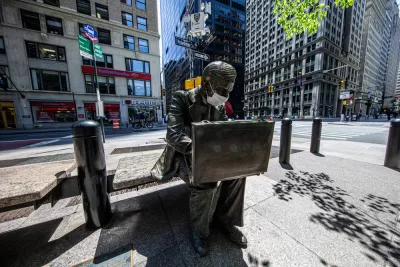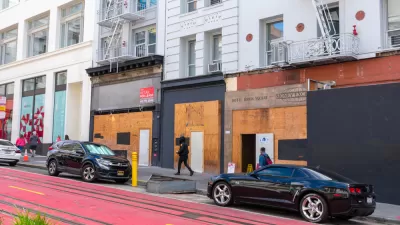The back-to-work data everyone is talking about? It comes from a security company that offers swipe badges for entrance into office buildings all over the country. Some experts say their data is too incomplete to be authoritative, however.

The data driving the public understanding of office vacancies in the wake of the Covid-19 pandemic has come into new scrutiny in recent weeks, first with a story in Bloomberg, and then a more skeptical article in the New York Post.
The company at the center of attention is Kastle Systems Inc., which provides security badges for building entry in 2,600 buildings in 138 cities, according to the article by Sarah Holder for Bloomberg.
Office occupancy has become intoxicating, according to Holder, and Kastle is at the forefront of the data reporting the trends in the post-pandemic workplace, publishing a weekly “Back-to-Work Barometer.”
“Fast-forward to 2022, and the 50-year old company has become, if not exactly a household name, at least the most well-known player in a not-so-sexy industry—and a key participant in the ongoing conversation about when, and whether, remote workers will get back to their desks,” writes Holder.
A few days after the Bloomberg article, however, Steve Cuozzo wrote an article for the New York Post offering another side to the story—i.e., that the "Back-to-Work Barometer” is far from complete.
“The widely cited Kastle Systems Back-to-Work Barometer, which claims to tally how many employees have returned to offices, misses hundreds of skyscrapers with the highest attendance — and the result is a whopping undercount, real estate insiders say,” writes Cuozo.
The controversy is reminiscent of the numerous occasions that housing experts have instructed media outlets not to rely on listing websites—which don't have access to significant swaths of the housing market, especially at the low end—to draw conclusions about the housing market.
Similarly, the Post analysis presented by Cuozzo finds that Kastle data misses too many large buildings in New York City to draw a complete picture of office vacancy.
FULL STORY: Meet Kastle Systems, the Covid-Era Kings of Back-to-Work Data

Maui's Vacation Rental Debate Turns Ugly
Verbal attacks, misinformation campaigns and fistfights plague a high-stakes debate to convert thousands of vacation rentals into long-term housing.

Planetizen Federal Action Tracker
A weekly monitor of how Trump’s orders and actions are impacting planners and planning in America.

In Urban Planning, AI Prompting Could be the New Design Thinking
Creativity has long been key to great urban design. What if we see AI as our new creative partner?

King County Supportive Housing Program Offers Hope for Unhoused Residents
The county is taking a ‘Housing First’ approach that prioritizes getting people into housing, then offering wraparound supportive services.

Researchers Use AI to Get Clearer Picture of US Housing
Analysts are using artificial intelligence to supercharge their research by allowing them to comb through data faster. Though these AI tools can be error prone, they save time and housing researchers are optimistic about the future.

Making Shared Micromobility More Inclusive
Cities and shared mobility system operators can do more to include people with disabilities in planning and operations, per a new report.
Urban Design for Planners 1: Software Tools
This six-course series explores essential urban design concepts using open source software and equips planners with the tools they need to participate fully in the urban design process.
Planning for Universal Design
Learn the tools for implementing Universal Design in planning regulations.
planning NEXT
Appalachian Highlands Housing Partners
Mpact (founded as Rail~Volution)
City of Camden Redevelopment Agency
City of Astoria
City of Portland
City of Laramie





























